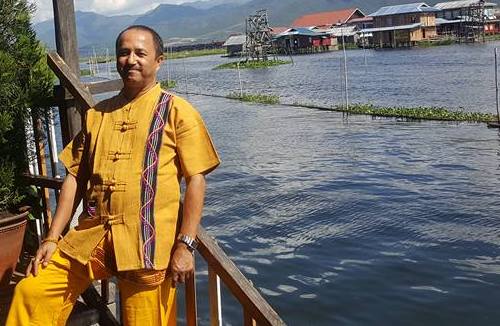 After traveling for days by bus and on foot, Asok Poudel Sharma arrived at his first job at a health post in rural Nepal – only to find an empty lot. Despite the seemingly disparate conditions, Asok was committed to stay and went on to build the first community health post in the district, extending health services to 6,000 people who had previously been unreached.
After traveling for days by bus and on foot, Asok Poudel Sharma arrived at his first job at a health post in rural Nepal – only to find an empty lot. Despite the seemingly disparate conditions, Asok was committed to stay and went on to build the first community health post in the district, extending health services to 6,000 people who had previously been unreached.
“Very early in my career I realized that bringing healthcare to remote communities would require a unique level of resourcefulness,” says Asok. “Seeing the challenges inspired me to make sure no one was deemed too difficult to reach.”
Asok has applied this same tenacity throughout his decades-long career, which he has spent implementing community health worker programs that expand access to primary healthcare in rural communities across Asia. From his first posting in Nepal—where in just one year he was able to employ two community health workers and one nurse midwife—to his current post in Myanmar, Asok has consistently recognized and advocated for the inclusion of community-based primary healthcare in national policies.
With much of his current work focused on supporting community health workforces, Asok decided to enroll in the Community Health Academy’s first leadership course, Strengthening Community Health Worker Programs to Deliver Primary Health Care, to improve his ability to build, optimize, and advocate for national community health worker programs.
Throughout the course, Asok has drawn parallels between the design and management of community health worker programs and the ability to bring these programs to scale. By understanding the context of countries that face similar challenges, he can better engage stakeholders to deploy resources that will maximize the utility of community health workers in his own community. He is already using best practices from the course to review the national community health worker program in.
“Many technologies have been invented, tested, and successfully implemented—but these case studies prove that we can also improve primary healthcare by investing in the systems, tactics, and human potential that strengthens community health workforces,” says Asok.
Upon completing the course, Asok is excited to work with governments and partners across Asia to prioritize community health worker programs and, ultimately, empower these critical workforces to reach their full potential.
Hear from Asok about his reflections on the Academy’s first leadership course!
This profile was written as part of a feature in our 2019 Annual Report, which showcases individuals from across all levels of the health system and the globe who play a critical role in the movement for universal health coverage – community leaders, government officials, philanthropists, clinical practitioners, policy specialists and more.




